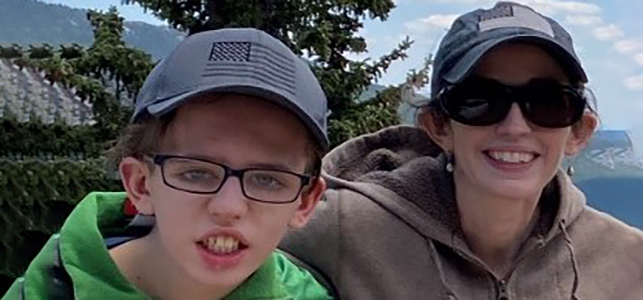
Fifteen-year-old Jackson Taylor and his mom, Anna, have traveled from their home in Colorado to Richmond twice to participate in a clinical trial at CHoR for continual myotonic dystrophy type 1. The rare genetic condition is a type of muscular dystrophy characterized by severe muscle weakness that can impact multiple body systems.
 Jackson has been receiving therapy for physical, fine motor and speech delays most of his life but wasn’t diagnosed with continual myotonic dystrophy type 1 until he was three years old. Since that time, Anna has learned that she, her dad and her sister have the adult onset form of the disorder. After meeting Dr. Nick Johnson, vice chair of research and associate professor at CHoR, at multiple conferences and learning about the studies he was conducting, Anna and Jackson decided to join the research.
Jackson has been receiving therapy for physical, fine motor and speech delays most of his life but wasn’t diagnosed with continual myotonic dystrophy type 1 until he was three years old. Since that time, Anna has learned that she, her dad and her sister have the adult onset form of the disorder. After meeting Dr. Nick Johnson, vice chair of research and associate professor at CHoR, at multiple conferences and learning about the studies he was conducting, Anna and Jackson decided to join the research.
“We finally got to meet with somebody who could give us some answers, and through these studies we’ve been able to find out more about continual myotonic dystrophy, life expectancy and other situations that affect continual myotonic children versus the adult onset,” Anna said. “Each time I come here, I find out more information on studies and different trial medications that may be coming out in the future. It’s made a very big impact on our life.”
Anna said the CHoR team is “helpful, knowledgeable, caring and understanding” when working with Jackson, who also has cardiac and gastrointestinal issues and is autistic. Despite his challenges, Anna described her son as “a funny kid” who enjoys school, summer camp, Disney Pixar, spending time with friends and being outdoors.
“Our hopes about participating in this study are to find information and future medications to help Jackson enhance his endurance, communicate better and manage additional muscle tightness, heart and gastrointestinal issues,” Anna commented. “There may also be things that will help him cognitively, which is probably the biggest issue he faces. Continuing to come here is going to be our strategy to help Jackson.”